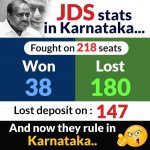'MLA can vote in House only after taking oath'
If an MLA does not take oath, he does not participate in the trust motion to be moved by CM BS Yeddyurappa on the floor of the House, lawyers in the know of the options being considered by the BJP camp told TOI and cited the SC's 1984 judgment in Pashupati Nath Sukul case.
The judgment said an MLA, even before taking oath, could vote in Rajya Sabha polls but could not participate in business of the House, which includes voting on a trust motion or no-confidence motion. "If a dozen MLAs from rival parties do not take oath and BJP is able to win over two Independent MLAs, it will be able to prove majority on the floor," a lawyer said.
The independents in discussion are H Nagesh and KPJP's R Shankar, who have so far not declared any intention of voting BJP.
The lawyers said the Sukul judgment is to be read along with Article 188, which says: "Every member of the legislative assembly or the legislative council of a state shall, before taking his seat, make and subscribe before the governor, or some person appointed in that behalf by him, an oath or affirmation according to the form set out for the purpose in the third schedule." This makes it clear that unless an MLA takes oath, he cannot take a seat inside the House and, hence, cannot vote.
This could give some credence to AG KK Venugopal's argument at the midnight hearing that whether the anti-defection law could be applied to MLAs who had not taken oath was a grey constitutional area. This argument was termed "preposterous" by a bench of Justices AK Sikri, SA Bobde and Ashok Bhushan.
This interpretation of the 1984 ruling by BJP's lawyers appears to have been confirmed by the SC in its judgment on April 24. A bench of Justices Madan B Lokur and Deepak Gupta, while dealing with a no-confidence motion case in a panchayat, held that since the Constitution categorically provided for it, an MLA has to take oath to participate in the voting. But the bench was divided on the question whether an elected panchayat member, without taking oath, could participate in a no-confidence motion vote.
Elaborating on this, Justice Gupta had written, "As far as judgment of this court is concerned (the 1984 one), the members of legislative assembly, who had not taken oath, were taking part in elections to the Rajya Sabha, which was definitely not part of the business of the legislative assembly.
According to me, members who have not taken oath and, therefore, do not have a right to vote for the no-confidence motion, cannot be permitted to sign such a motion." Justice Gupta had extended the same logic to panchayats, where it had not been made mandatory for a member to take oath.
Karnataka floor test: Two Congress MLAs absent at Vidhana Soudha
02:19
'MLA can vote in House only after taking oath' - Times of India







 Keep it coming
Keep it coming 